Gerry Adams's Blog, page 68
April 5, 2013
A truth process for all
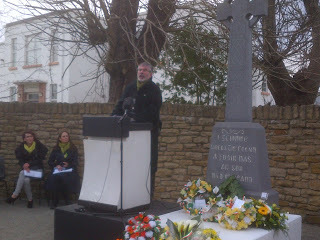
Drumboe was cold but the welcome was warm. This year the powers that be had decided I would be the main speaker at the Drumboe commemoration in County Donegal. People were glad to see me and I them.
The surrounding mountain peaks had coverings of snow but unlike Belfast there was none on the roads or footpaths. But it was bitterly cold. It had a sharpness that cut to the bone and left ears numb.
The Drumboe commemoration is held each Easter at the republican memorial to the IRA volunteers of County Donegal who from every generation have fallen in pursuit of freedom and sovereignty. The Celtic Cross and the small plot that holds it, can be found at the end of the main street of Stranorlar, just before you cross the arched bridge that brings the traveller from the north side of the River Finn, to Ballybofey on the south side.
Stranorlar was among the first garrison towns in Ulster in the 16thcentury built after the plantation. Even today there are no schools or churches in Ballybofey - they are all in Stranorlar – a hangover from those days and the penal laws.
The proximity of the twin towns to west Tyrone and the closeness of the communities that live on either side of the border also means that all of those republicans on the rolls of honour and remembrance for Donegal and west Tyrone are remembered each year at the Drumboe Easter Commemoration.
This year holds a particular significance because it marks the 90thanniversary of the four Drumboe martyrs - four IRA fighters, Charlie Daly, Sean Larkin, Daniel Enwright, and Timothy O' Sullivan who were captured and held in the nearby Drumboe castle from January 1923 until they were executed by Free State forces on March 14th1923.
The Tan War against British forces was deadly and vicious, but the civil war left a bitterness and a political legacy that still shapes politics in the Irish state to this day. The civil war turned brother against brother, and neighbour against neighbour. The four who were shot by firing squad at Drumboe were among 77 republicans executed during those terrible years by the Free State.
There was never any process of truth recovery or reconciliation put in place after those catastrophic events. We should learn from that mistake.
During the recent conflict others died in the south as a consequence of the conflict. Tom Smyth, a republican prisoner, was killed in Portlaoise prison and Hugh Hehir was shot dead in County Clare. During the era of the heavy gang many citizens were brutally assaulted. Beatings were also common place within the prison systems. And there was collusion between elements of the Irish Defence Forces and the British forces in the north. We remember the death of Donegal Councillor Eddie Fullerton and others. But it is important that Republicans also acknowledge that we too inflicted great hurt. Members of the defence forces, including An Garda Síochána were killed by republicans. These matters need to be faced up to. Sinn Féin believes that the best means of addressing these matters is through the establishment of an Independent International Truth Commission.
The two governments’, former combatants and those in leadership across Ireland and Britain need to part of such a process. There can be no hierarchy of victims. The people of this island need a genuine process of national reconciliation. I am prepared to meet with victims’ families and others as part of this.
There is a need for a healing process so that we can all go forward in a united and harmonious way looking after victims, and victim’s families and survivors is a significant and important part of this. The proclamation of 1916, which is the mission statement of Irish republicans, is explicit in its anti-sectarianism. This is important as republicans seek to address at what is the start of the north’s orange marching season, the controversy over flags and emblems. Unionist leaders have to face up to the reality that the old ways and the old days are gone. The vast majority of citizens want to live in a fair society based upon equality and Sinn Féin is committed to bring that this about. This means being prepared to enter into a rationale and informed debate with those who represent disadvantaged unionist communities about the difficulties they face every day and to vigorously challenge sectarianism and segregation and inequality.
Irish republicans are absolutely committed to the principles of equality and parity of esteem, and mutual respect contained in the Proclamation and in the Good Friday Agreement. The tiny minorities on all sides who espouse violence must be rejected. They are stuck in the past while all around them Ireland north and south is changing. Their actions will not destroy the peace process, or the efforts to create a new republic, but they can destroy lives, including those held in the prisons. The British government also cannot evade its responsibility in this respect. The continued imprisonment of Marian Price and Martin Corey is unacceptable. They should be released.
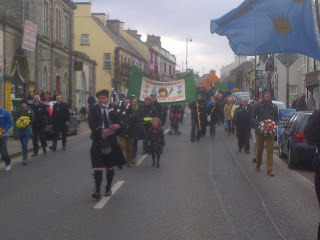
Published on April 05, 2013 05:38
April 2, 2013
LONG JOURNEY HOME.
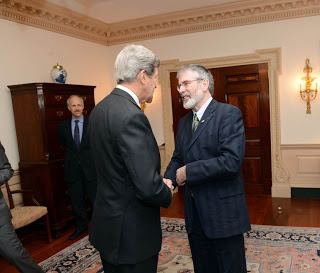 US Secretary of State John Kerry
US Secretary of State John Kerry
This blog was written as I returned from the USA two weeks ago following a few hectic days marking St. Patrick's feast day. I get to travel a lot even when I don't feel like it. From the Meath East by-election to Washington DC is a tidy number of miles but there is a rhythm to stress free travelling which I follow now for years. The key is not to get stressed, to be on time and to be mindful that there is an end to every journey. It is also a good thing not to be overwhelmed by schedules - especially Sinn Féin schedules. Go with the flow. And get a walk when you can as often as you can.
So from Belfast to Newark across the Atlantic in my sleep before solid ground welcomes my feet and the rest of me to the USA. A few train switches and then the almost three hours railway trek to DC. Nineteen hours later and collapse into bed in a downtown hotel room. Weather? Cold, wet and windy. Sinuses on a Tet offensive. Not enough duvets on bed. RG snoring. No way to spend Saint Patricks Day.
But next morning Friends of Sinn Féin and Joseph Smiths wonderful hospitality cheers us all. Here they have a Saint Patricks Week. And a jolly old week it is too. Busy. Our delegation is joined by Mary Lou. We are led by Rita O Hare.
We are early for our morning meeting with Secretary of State John Kerry so RG and I take a walk down to the corner. Set among holly and elm trees in the grounds of the National Academy of Sciences there sits a 12 foot bronze likeness of Albert Einstein. It’s a remarkable piece of sculpture of Einstein holding in his left hand a paper with the equations that marked his three most important scientific discoveries.
It’s then back to the State department for our meeting with Secretary Kerry. We talk about the peace process, the threats to it, the future, a border poll and the middle east. From there I’ts over to a series of briefings with our friends on Capitol Hill, to a fundraising lunch replete with some of the most powerful labour union leaders led by the fiery Terry O Sullivan, to a walk around the block and dinner in Bobby Vans, it is all go.
Ditto the next day. More briefings on the Hill. Met up with senior Congress members Richie Neal and Peter King and other stalwarts in Congress and the Senate. Then the Speakers Lunch where the Taoiseach and the President say their cupla focal and we dine on lamb and praties on a bed of green white and orange vegetables. Good straight words from the Taoiseach about the north. Delivery essential when he gets back. Martin Mc Guinness is there too. Alongside Peter Robinson. On the last leg of their long journey home from Latin America and the west coast of USA.
RG and I get a walk. The weather has changed for the better. Saint Patrick turned the stone. Big blue sky. lovely sunshine. almost summery. Visit Macey’s but buy nought. Can't find a book shop. Back to Capitol Hill to meet Senator Patrick Leahy and from there to the White House.
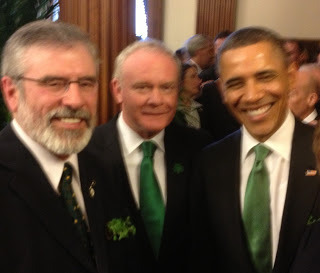 Almost missed speeches. Was settled in White House library browsing. But a nice woman in a uniform alerted me in a soft prairie drawl to Presidents remarks starting. He was very positive on immigration issues. Met lots of old friends from Ireland and USA. Delighted to see Matt Molloy from The Chieftans. Great ceoltoir and a sound man.
Almost missed speeches. Was settled in White House library browsing. But a nice woman in a uniform alerted me in a soft prairie drawl to Presidents remarks starting. He was very positive on immigration issues. Met lots of old friends from Ireland and USA. Delighted to see Matt Molloy from The Chieftans. Great ceoltoir and a sound man.And so mission almost completed, we retire to Bobby Vans again for what is now our traditional Saint Patricks dinner courtesy of Joseph. Met some disabled Vietnam veterans. There are 31 million combat vets here. Made me think of Pete Seegers ‘Where Have All The Flowers Gone’? And so to bed.
And then we headed back to whence we came. Was it a good trip? Yes. We got to brief powerful and influential people on current state of the process of change back home. From Marian Price, Pat Finucane., Ballymurphy families, Border poll, to Undocumented Irish and the need for an end to sectarianism and segregation. And all the bits in between like the Bill of Rights and Acht na Gaeilge.
What was main message?
It's not over yet. Our journey continues. Lots to be done. And we need our friends in the USA to complete the journey with us.
Published on April 02, 2013 07:54
March 27, 2013
Become champions for deaf children – Adams
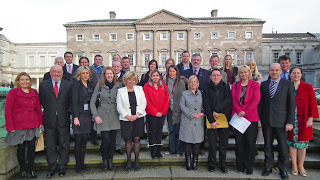 Today I hosted a briefing in the Dáil by parents from the Happy New Ear group. The group have been campaigning for the introduction of a bilateral cochlear implant programme. Currently, children in this state who are profoundly deaf only receive one cochlear implant, rather than the two which is accepted as best international practice.
Today I hosted a briefing in the Dáil by parents from the Happy New Ear group. The group have been campaigning for the introduction of a bilateral cochlear implant programme. Currently, children in this state who are profoundly deaf only receive one cochlear implant, rather than the two which is accepted as best international practice.I urged TDs and Seanadóirí who attended todays briefing to become champions for those children and adults in need of bilateral cochlear implants and to increase our lobbying of the Minister for Health in advance of the budget estimates in June for Budget 2014.
This is a very winnable campaign. It is an issue that the government can fix. It needs political will. The HSE has commissioned a business plan to be submitted in June for inclusion in its estimates for Budget 2014. We need to increase our efforts to ensure that this business plan is comprehensive and effective and that the necessary funds are included for a bilateral cochlear implant programme.
All of the Oireachtas members who listened to the parents were impressed and moved by the contributions. The parents spoke powerfully about the courage and the difficulties faced by their children. And they explained that the absence of the second implant can also create problems for the children. Without a second implant children find it more difficult to differentiate speech in noisy environments; they can’t located direction for a sound and the stress of trying to hear is exhausting.
The provision of cochlear implants for children is an issue of fundamental rights. It is also a race against time as the auditory nerve to which the implants are connected becomes more redundant every day and will eventually die if they are not being used.
It is also accepted that there are around 200 children throughout the state who may be able to avail of this service.
International best practice demands that children receive bilateral implants. For the last 17 years the practice in this state has been for a single implant.
All of the parties in the Dáil and Seanad and the independent groups were represented at the briefing. I appealed to them to raise this issue in their groups meetings and to use the few months between now and June to increase pressure of the Minister and the HSE to ensure that a fully costed bilateral cochlear implant programme is put in place for next year. Support the Happy New Ear group and go onto their website and facebook page. Just google Happy New Ear.
Published on March 27, 2013 15:05
Government made huge mistake on Cyprus crisis
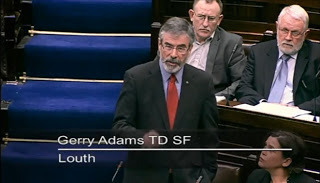
Two weeks ago the European Council met. The meeting focused on the “European Semester” and the economic priorities for the EU in 2013. It is clear, both from the economic priorities emanating from the Council and its approach to the Cyprus crisis, that the EU is wedded to the failed policies of austerity. There is nowhere the dynamism and determination needed to tackle the jobs crisis across the EU.
However it is the events in Cyprus that have dominated political and public attention in the period since that meeting.
This morning in the Dáil there was an opportunity for party leaders to speak on the Council meeting but most speakers concentrated Cyprus. It is there that we see the real dysfunction at the heart of the EU approach to the economic crisis.
The fact that the Euro Group, including Minister Noonan, would sign up to a bailout which contained a levy on bank depositors under and over €100k, while sparing Senior Bondholders in the banks, quite frankly beggars belief. That was a huge mistake by the Irish government.
In his statement this morning the Taoiseach admitted that the issue was not discussed in detail at the summit, yet the government welcomed and signed up to EU/ECB/IMF proposed bailout and levy, and European leaders then stood back over the last week and allowed Cyprus to be brought to the brink of economic collapse.
Instead of assisting the people of the island, they have bullied it and accused the Cypriot people of being the authors of their own demise. So, much for European solidarity.
We don’t see such allegations being hurled at larger European states when they get themselves in difficulty.
The revised bailout agreement means that senior bondholders will now take a hit as will deposit holders over €100,000.
While I welcome the decision not to hit deposit holders under €100,000 the reality is that the Rubicon has been crossed. International depositors looking at the mess in Cyprus may consider not just withdrawing their money from banks there, but from across the EU.
It is claimed that there are several large multinationals who reportedly withdraw their money from Eurozone banks every Friday in case something happens over the weekend – and that was before this latest crisis. So, the prevailing sense is of a European establishment making it up as it goes along.
The decision to try and hit depositors under €100,000 puts into sharp focus ECB President Mario Draghi’s statement last July that the bank will do whatever it takes to preserve the Euro.
This appears to now include hitting depositors and possibly those with under €100,000 in a bank. The government welcomed this. That was a mistake. The Cypriot Parliament rejected it but the damage was done by then.
Why should investors, especially large investors, trust the EU or ECB? Fears that bank accounts could be raided in future bailouts were given added weight by the head of the Eurozone Finance Ministers who at first suggested that the Cyprus bailout could be a template for future action and then he had to retract this.
The ECB put Cyprus under huge pressure to agree a plan by threatening to collapse its banking system. The bailout package that has now been agreed includes the increase in their corporation tax from 10% to 12.5%.
This is a sovereign state having a new tax rate imposed on it. The government claims that the EU cannot make us increase our corporation tax rate – yet the government was part of the group forcing this on Cyprus. At the beginning of the Irish banking crisis Sinn Féin called for bondholders to be burned.
Fianna Fáil, Fine Gael and Labour told us it would never happen. They derided our approach and claimed that the EU would never let it happen, and that banks had to be bailed out at any cost.
The EU has now signed off on the burning of senior bondholders in Cypriot banks.
Last June, the Government also told us that a seismic game changer had been reached in Europe, which would see the separation of banking debt from sovereign debt. The Taoiseach told us that in future bank crises, the ESM would directly recapitalize banks and the sovereign would not be expected to take on a bank bailout.
He told us that because we had taken on this liability, we would be retrospectively recapitalized.
The EU could have committed to using the ESM to cover losses needed for the Cypriot Banks. They didn’t do this. And there is now uncertainty over the commitment to separate sovereign debt from Bank debt.
Comments over today and yesterday by some politicians cast doubt over whether the ESM will ever be used to recapitalise banks whether retrospectively or not. Yesterday the European Commission confirmed that it hopes the ESM fund will not be used for directly recapitalising banks.
This seems to confirm comments by the chief of the euro zone finance ministers Jeroen Dijsselbloem, who questioned whether the ESM bailout fund will ever be used to rescue banks directly.
There seems to be a complete U-turn in EU policy in relation to the use of the ESM and the burning of senior bondholders.
And this is a u-turn which causes real problems for citizens of this state which had this debt foisted on us by Fianna Fáil. We now have a legacy bank debt which may never be dealt with.
So, the government has serious questions to answer. What is the point of the ESM and where does Europe now stand on banking solidarity?
What is the Irish Governments attitude towards the burning of depositors in Irish/European banks and why did the Government support it in the Cypriot case?
And will the citizens of this state ever receive debt assistance for the debt this Government and the previous Government put on the shoulders of the taxpayers to bail out banks with taxpayers’ money?
Finally and prior to the European Council meeting the Taoiseach agreed to raise the Jerusalem report that had been just been made public and which was written by EU diplomats in the Middle East.
The report raised serious concerns about the actions of the Israeli government in building settlements and excluding Palestinians for their land. The Taoiseach made no mention of that in his statement this morning or subsequently. So, I don’t know whether he did or didn’t raise the report as promised. It is a matter I intend to return to.
Published on March 27, 2013 08:30
March 26, 2013
The Property Tax - A Tax too far
This week saw Sinn Féin publish a Bill which seeks to repeal the Property Tax. The Financial Local Property Tax Repeal Bill is about lifting the burden of this unfair tax off families and households and to replace it with alternative measures to raise taxes, including a wealth tax. The record of this government in its two years in power has been appalling. Fine Gael and Labour were elected to undo the damage of Fianna Fáil but have chosen instead to implement Fianna Fáil policies.
The government’s austerity policies are driving up poverty and disadvantage. Emigration and unemployment are at record levels; public services, particularly health, are in crisis and there are more cuts to be imposed this year; the economy is flat lined and another new tax – the family home tax – is to be forced on households in the coming months.
Both Labour and Fine Gael opposed the property tax in opposition. The Taoiseach said in the Fine Gael election manifesto that:
“Fianna Fail’s proposal, now endorsed by the Labour Party, to introduce by 2014 an annual, recurring residential property tax on the family home is unfair” (P59)
But on his watch householders across the state have now received letters from revenue demanding payment of a tax on their family home. The first payments are due in the summer. This is a tax that takes no account, of ability to pay, those in negative equity, those who paid stamp duty or the 140,000 families in Mortgage distress. The financial implications for households are very serious. It will especially punish those on low and middle incomes, social welfare recipients and the disabled.
It is a tax proposed by Fianna Fail and implemented by Fine Gael and Labour. It is a tax with no waivers and whose so-called exemptions are quite frankly a joke. This family home tax is a draconian piece of legislation which takes no regard of the impact it will have on parents trying to put food on the table or to heat their homes.
The government is pursuing a policy which will drive more and more people even further into debt.
It has also ensured that the revenue has the means to take this tax irrespective of the individual or family circumstances. The tax can be deducted from people’s social welfare, from wages, from their Bank accounts, and even from their Credit Union accounts.
Michael Noonan said: "The Revenue know how to collect taxes and they WILL collect taxes and they are also being mandated to collect the arrears on the household charge."
The government has taken a totally coldblooded stance. Regardless of a person’s ability to pay the money, it will be taken directly at source from wages or pensions or social welfare.
Households will have to manage a dwindling income. Some will buy less food; others will turn down or off the heating; children will have to make do with more hand-me-downs and all the time the government will impose more stealth taxes like water charges.
The reality is that the government is creating additional debt at a time when the economy desperately needs consumers to be spending more to lift the domestic economy, save jobs and encourage growth.
The reality is that the Property Tax is for many households a tax too far. Many families will be pushed over the edge by this tax. When added to the taxes and charges introduced by the coalition government, including the Household Charge, increases in VAT, septic tank charges, cuts to child benefit and much more, it will have a grievous impact on working families.
It is being introduced by Labour and Fine Gael to raise money to pay the debts of the banking system not to provide public services for citizens. In fact funding is being cut for public services by these parties.
There are alternative measures that the government could have taken, including the introduction of a wealth tax on all property, liquid and assets, above a certain net wealth.
Sinn Féin’s proposal is to levy a 1% wealth tax on all net wealth over €1 million with certain exclusions. Because it is net wealth, it takes into account mortgages and loans. Because it has a high value, it protects struggling families. And because it is aimed at high net worth individuals, it is dealt with by people used to engaging with the revenue system, who very often have tax accountants dealing with the system on their behalf.
So Fine Gael and Labour had a choice. They could have opted to take more from those who can afford it. Instead, Labour and Fine Gael chose to inflict more pain on struggling families.
Sinn Féin intends introducing a bill to reverse the Property Tax. In the meantime we are urging citizens to lobby their local politicians, particularly government TDs and councillors to support the bill. The only way to stop this tax is to repeal the legislation. No other measures such as boycott or refusing to value your home will work. We need to build campaign for the repeal of the bill and that is where Sinn Féin is focussed.
Published on March 26, 2013 09:00
March 13, 2013
A Treasure Trove of Art
 Our Lady's Nursing Home, Falls Road By Kieran Trainor The west Belfast Féile an Phobail is a remarkable community based enterprise. It never ceases to surprise and amaze me. This year marks 25 years as a thriving peoples’ festival. Over that time great playwrights’, poets, singers, writers, actors and extra-ordinary citizens have showcased their talent.
Our Lady's Nursing Home, Falls Road By Kieran Trainor The west Belfast Féile an Phobail is a remarkable community based enterprise. It never ceases to surprise and amaze me. This year marks 25 years as a thriving peoples’ festival. Over that time great playwrights’, poets, singers, writers, actors and extra-ordinary citizens have showcased their talent.As a founding member and as a director of Féile I have had the pleasure to meet many of them. Sadly this week I opened an exhibition for one local exceptionally talented artist who tragically died very young but who left behind him a breath taking collection of paintings, drawings and sketches.
Kieran Trainor was born on October 19th 1964. He grew up in Beechview Park, just off the Whiterock Road, not far from where I lived in Ballymurphy.
Like most of his contemporaries Kieran attended St. Thomas’s Secondary School on the Whiterock road. But his talent was clearly recognised and he sat his A Level art at the early age of 16. Kieran achieved the joint highest grade for A Level art in the north that year.
The exhibition of his work is part of Féile an Earraigh – the Spring Festival of Féile. It is being held in An Cultúrlann and will run there, in one of the exhibition rooms upstairs, until the weekend.
If you get a chance go and look at it. If like me you are from the area you will recognise Our Lady’s Nursing Home, which was out Kieran’s back door, as well as the City Cemetery, St. Peter’s Secondary School, and the Falls Park. Our Lady’s is now part of the Meanscoil.
Some of the local scenes – like the plots – are long gone due to redevelopment. Kieran liked to paint these and the old house on the Giant’s Foot.
The British Army fort that occupied McCrory Park was right outside his front door and he painted it too.
Kieran went to Belfast Art College where I’m told he made a great impression on his tutors and fellow students. He was a prolific artist. His friend Brendan says Kieran loved landscape painting and painted in the style of the English painter Constable who he greatly admired, and could produce several paintings day.
Kieran was not keen on the abstract expression that was the norm in the Art College of that time but he studied for and achieved his BA Hons in three dimension design. He went on to work for several of the most important architectural practices in Ireland at that time.
Kieran was also a talented musician and was a founding member and guitarist in St. John’s Choir in Whiterock which I used to listen to on a Sunday at Mass there.
Tragically Kieran was killed in an accidental fall while living in Newry in 1997. And that could so easily have been the end of his story. For the next 15 years his paintings lay under covers in the family home.
 However, last year two of his friends Brendan and Matt went into the attic and undercovered this treasure trove of art work. They then had the great good fortune of taking some of them to an exhibition which Margaret McKernan had organised during last years’ Féile. Margaret immediately recognised the quality of the work and this year helped organise another art exhibition but this time of Kieran Trainor’s work.
However, last year two of his friends Brendan and Matt went into the attic and undercovered this treasure trove of art work. They then had the great good fortune of taking some of them to an exhibition which Margaret McKernan had organised during last years’ Féile. Margaret immediately recognised the quality of the work and this year helped organise another art exhibition but this time of Kieran Trainor’s work.Margaret was so captivated by the paintings that in her email ordering me to open the exhibition she described how Kieran’s work is ‘amazing, capturing the light and applying various mediums to produce such great art.’ It was, she said ‘so based on who and what Féile is about I had to make space.’
And she is right. This exhibition is exactly what Féile is about – providing a space for a local artist to exhibit his work. Regrettably Kieran is not here but his sister Colette was at the launch on Monday night. She had loyally protected and kept safe her brother’s work and she was now present to see it put on display.
Looking at Kieran’s paintings I was reminded of another west Belfast artist, Gerard Dillon who lived in lower Clonard Street. Gerard’s work is now eagerly sought and he is a world renowned artist. But although he spent his later years in Connemara he never forgot his roots.
In 1969, Dillon withdrew his work from the Belfast leg of the Irish Exhibition of Living Art. In a letter to the Irish Times on August 20th only days after loyalist pogroms in Belfast he protested at the 'arrogance of the Unionist mob'.
So, if you have a wee bit of time drop into the Culturlann and marvel at the talent of a local artist who will now be remembered for the great artist he is.
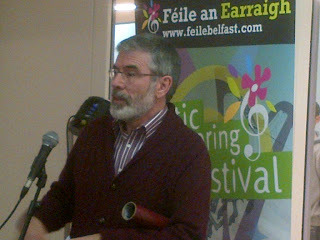
Féile an Earraigh
Published on March 13, 2013 10:28
March 12, 2013
Release Marian Price and Martin Corey
I had the opportunity today (Tuesday) to raise the continued wrongful imprisonment of Marian Price and Martin Corey in prison in the Dáil during Taoiseach's Questions.
I said: "Marian Price and Martin Corey should not be in prison. Sinn Féin made representations to the parole hearing and was informed that these two individuals would be a threat to the peace process if released.
I wish to state on the record of the Dáil that they would not be a threat to the peace process if released.
Their detention is actually the threat to the peace process.
Ms Price and Mr. Corey are a threat to the peace process as a result of the circumstances in which they are illegally detained.
I look to the Government to raise this issue in the United States and also with the British authorities before the review of their detention concludes.
The last thing we want is a judgment handed down by a kangaroo court to the effect that Ms Price will be held in detention for ever and a day. She and Martin Corey need to be released.”
I said: "Marian Price and Martin Corey should not be in prison. Sinn Féin made representations to the parole hearing and was informed that these two individuals would be a threat to the peace process if released.
I wish to state on the record of the Dáil that they would not be a threat to the peace process if released.
Their detention is actually the threat to the peace process.
Ms Price and Mr. Corey are a threat to the peace process as a result of the circumstances in which they are illegally detained.
I look to the Government to raise this issue in the United States and also with the British authorities before the review of their detention concludes.
The last thing we want is a judgment handed down by a kangaroo court to the effect that Ms Price will be held in detention for ever and a day. She and Martin Corey need to be released.”
Published on March 12, 2013 16:42
March 7, 2013
Israel flouts international law
In separate letters to the Taoiseach and the Tánaiste and in the Dáil on Tuesday, I urged the Irish government to use the good offices of the Presidency of the EU, which it currently holds, to raise the report of the EU Heads of Mission in Jerusalem at the next meeting of the EU Leaders. The Taoiseach agreed to do this.
The content of the EU report has only emerged in recent days although the report itself was handed over to EU governments in January.
It makes grim reading and is a scathing indictment of the Israeli government’s flouting of international law and its violation of the rights of Palestinian citizens living in East Jerusalem and the occupied territories.
The report finds that the Israeli settlements in East Jerusalem and the west bank are ‘the biggest single threat to the two state solution.’
The EU report accuses the Israeli government of implementing a settlement policy that is ‘systematic, deliberate and provocative’.
It concludes that Israel is pursuing a deliberate policy of seeking to drive Palestinians out of East Jerusalem through restrictive zoning and planning, demolitions and evacuations, discriminatory access to religious sites, an inequitable education policy, difficult access to health care and inadequate provision of resources.
The 15-page report from the EU diplomats identified settlement construction on the southern flank of east Jerusalem -- in Har Homa, Gilo and Givat HaMatos - as being the "most significant and problematic".
The diplomats warned that this construction would likely cut the area off from Bethlehem by the end of the year.
‘The construction of these three settlements is part of a political strategy aiming at making it impossible for Jerusalem to become the capital of two states … If the current pace of settlement activity on Jerusalem's southern flank persists, an effective buffer between east Jerusalem and Bethlehem may be in place by the end of 2013, thus making the realization of a viable two-state solution inordinately more difficult, if not impossible.’
The report also focuses on plans announced by Israel late last year to build 3,426 units in E1 -- a strip of West Bank land east of Jerusalem. If this project goes ahead the EU report concludes that it will effectively cut the West Bank in half.
The Heads of Mission Jerusalem Report 2012 indicts Israel of violating ‘international humanitarian law’.
The report, which was written by the EU heads of mission in Jerusalem and Ramallah, makes six recommendations. It calls on the European Union to ‘prevent, discourage and raise awareness about problematic implications of financial transactions, including foreign direct investments, from within the EU in support of settlement activities, infrastructure and services.’
It recommends that the EU, which is Israel's largest import and export market and accounts for about a third of Israel’s total trade, should take sanctions against settlements in East Jerusalem and the west Bank. It wants settlement products clearly labelled to ensure that ‘imports of settlement products do not benefit from preferential tariffs’. “
The information in this report cannot be ignored or set aside.
It also has to be seen in the context of the deteriorating political situation following the death in disputed circumstances of Arafat Jaradat, who was arrested by the Israeli Army for throwing a rock and who died five days later on Saturday February 23rdin Megiddo Prison. His family, who party colleague Pat Sheehan met several days ago in Palestine, have accused the Israeli authorities of torture. The UN Middle East peace envoy Robert Serry has called for an independent international inquiry into Israel's treatment of Palestinian detainees. I would echo that call.A letter sent by the Palestinian UN Ambassador to the security council revealed that Jaradat was ‘subject to severe beatings, abuse and medical negligence during his captivity’. The letter said that Jaradat had six broken bones in his neck, spine, arms and legs along with other injuries.The situation was exacerbated by the shooting of two children by Israeli troops. 13 year old Mohammed Khaled Qurd was shot twice by an Israeli soldier. Film footage shows him standing some distance from where a petrol bomb was thrown at a heavily fortified Israeli outpost.The continuing detention of over 4,500 Palestinian prisoners and their conditions of imprisonment has been the catalyst for much of the recent violence. It is usual for prisoners to be held in solitary confinement, some for years, and they are frequently denied visits from their family. Many of those being held are also kept in constant lockup with little access to fresh air or exercise. The UN Middle East peace envoy Robert Serry has called for an independent international inquiry into Israel's treatment of Palestinian detainees. I would echo that call.I also believe that the Irish government needs to provide leadership on this issue. It currently holds the Presidency of the EU. This EU report provides clear evidence of Israeli breaches of international law and the implementation of policies that are reminiscent of the homeland policy of the old apartheid regime in South Africa. The Irish government should act urgently on the information and recommendations made by EU officials. This should include the introduction of EU wide legislation to prevent Israeli products manufactured or grown in Israeli settlements in East Jerusalem and the West Bank from benefitting from preferential tariffs agreed under an Israeli-EU trade agreement.
Published on March 07, 2013 04:10
March 5, 2013
Condolences on death of President Chávez
I learned tonight with sadness of the death of President Hugo Chávez.
On behalf of Sinn Féin I want to extend my sincere condolences to Vice President Nicolás Maduro and to the people and government of Venezuela and to the family of Venezuelan President Hugo Chavez who died this evening in Caracas.
President Chávez worked tirelessly to improve the lives of Venezuelan citizens. He dedicated himself to building a new and radical society in Venezuela.
His progressive social and economic changes took millions out of poverty. He extended free health care and education for all citizens and his re-lection last year with a huge majority was testimony to his vision.
President Chávez was a hugely influential figure in South America and in world politics. He was an energetic and enthusiastic leader and when it was discovered that he had cancer he confronted his illness with the same courage and determination that marked his political life. He will be greatly missed.
Published on March 05, 2013 15:36
March 2, 2013
Protecting Workers Rights
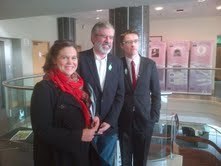 Mary Lou, mise agus Senator David Cullinane
Mary Lou, mise agus Senator David CullinaneToday Sinn Féin is holding a conference in Liberty Hall looking at the last century of workers in struggle.
I gave the opening speech, welcoming guest speakers, setting the historical context, and raising the issues of today, especially the role of the Labour Party and the Croke Park 2 agreement.
The initial bullet points gave a sense of the focus of my remarks and they I include the full text.
Protecting Workers Rights
· 100 years after the Lockout this state is only one of three EU member states in which workers have no legislated right to workplace representation – have no right to sit across from their employers and negotiate the terms and conditions of their employment.
· Workers have no right to collective bargaining.
· The government claimed that current legislation provides adequate protection.
· Workers deserve protection and they don’t have that.
· They deserve the legal protection of the government, particularly a government which has a Labour party component.
· Far from protecting workers on low and middle incomes the government has aggressively gone after their increments and unsocial hours pay.
· The Government threatens worse if the trade unions don’t acquiesce to this plan.
· This threat, understandably opened up a dilemma for Trade Union leaders.
· Is the outcome of the recent negotiations better than one which would be produced in a Government legislated pay adjustment?
· Clearly some think it is.
· Which means that they have little confidence in this government, and while that may well be a given about Fine Gael what does this lack of confidence say about the relationship of the wider Labour movement and the Labour Party?
· What is the point of Labour in government if it is not about protecting workers and working families and promoting equality?
· And what say does the wider Labour movement have in these matters?
· These are difficult times. Sinn Féin understands that.
· The working people of this island, and I include workers from the unionist constituency, need to hear an alternative to the right wing ideology which underpins many of our political and media institutions.
· There is a battle of ideas to be won and an alternative to be forged.
· Surely the leaders of organised Labour in the trade unions have a role and a duty to be part of this.
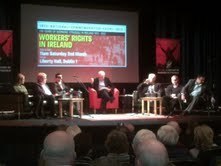
Eamon Dunphy chairs panel discussion
Full Text remarks:
Ba mhaith liom fáilte a chuir roimh na cainteoirí óna Ceardchumainn; na staraithe, na hiriseoirí, na ceoltoirí agus na scríbhneoirí atá ag glacadh páirt san ócáid speisialta ceiliúrtha seo “Céadbliain de streachailt oibrithe 1913 – 2013”
I want to welcome all of our guest speakers from the Trade Union Movement; the historians, journalists, musicians and writers who are participating in this very special event celebrating ‘A century of Workers in Struggle 1913-2013’.
I want to especially commend Seanadóir David Cullinane and the Sinn Féin organising committee who put a lot of time and effort into this event.
The Dublin of 1913 was a city of grinding poverty and exploitation. Infant mortality was among the highest in the world at that time. Thousands of families lived in single rooms in crumbling tenement houses.
Workers had no rights. They were hired and fired at the whim of employers. The children of workers had no childhood and no future. They often worked from a very young age. In my home city of Belfast at that time female and child labour predominated in the Linen Mills. Other citizens lived and worked in appalling conditions; in the Docks, the Shipyards and in casual labour. In 1911 James Connolly was appointed Belfast organiser of the Irish Transport and General Workers Union. Connolly organised the workers of Belfast and especially the Linen slaves. He described their conditions: ‘Many Belfast Mills are slaughterhouses for the women and penitentiaries for the children …’ where ‘with clothes drenched with water, and hands torn and lacerated as a consequence of the speeding up of the machinery, a qualified spinner in Belfast receives a wage less than some of our pious millowners would spend weekly upon a dog.’
Ireland was also part of the British Empire. As a colony Ireland was used and abused and exploited in the interests of British capitalism. As our long history of struggle for freedom records, in every generation Irish men and women have opposed British government involvement in Ireland. But nationalists and republicans were not alone in combating the evil of colonialism.
The early trade unions of the 1700s – combinations of skilled and unskilled workers –like the Belfast Cabinetmakers Club, the Regular Carpenters of Dublin, and the Ancient Corporation of Carpenters of Cork and others, all stood in defiance of those who sought to exploit their members. The first anti-union laws were introduced in Ireland in the 1720’s.
But it also has to be acknowledged that colonialism and discriminatory industrial development, primarily in the Lagan basin around Belfast, and the use of sectarian politics, led to an early division among Irish trade unionists with the creation of Irish based and British based trade unions. In 1894, the year in which the Irish Trades Union Congress was established, there were 51 Irish based unions with a total membership of 11,000. British based unions had a similar number of members.
But for all trade unionists the 1913 Lockout was the tipping point in modern Irish trade union history. Workers and their families and their union, found themselves in a pitched battle against the political, economic and media establishment of their day.
When the Irish Transport and General Workers Union succeeded in recruiting the workers in the Dublin United Tramways, the Company proceeded to dismiss all known union members. The Dublin bosses demanded that employees across hundreds of workplaces sign a pledge never to join or associate with the ITGWU.
However, in a remarkable display of solidarity thousands of workers refused to sign and were dismissed as one after another places of work closed their gates to union members.
The employers had the backing of the British authorities in Dublin Castle and the Dublin Metropolitan Police. During the months of the Lockout, police and workers fought running battles, when the DMP moved against protesting workers.
James Nolan and John Byrne were killed. And on August 31 the British authorities banned a mass meeting in O’Connell Street which was then savagely attacked by the police resulting in Ireland’s first Bloody Sunday of the 20thcentury. One consequence of this was the formation of the Irish Citizen Army.
The end of the Lockout in early 1914 was inconclusive but the result was not. Poverty forced strikers back to work but far from breaking the trade union movement the Lockout saw it consolidate its strength and significantly grow in the following decades.
The central issue in that dispute was the right to join a union, to organise, to be able to engage in collective bargaining. It was about the right of workers to be treated decently and fairly. Regrettably, these problems still persist.
Connolly understood the importance of the connection between the national and the social. They are the opposite sides of the same coin. He famously linked the cause of Ireland with the cause of Labour - and was a fierce opponent of plans for partition. He argued, correctly, that it would create a carnival of reaction.
Connolly and Pearse and the leaders of 1916 presented a vision of a different Ireland. It is found in the words of the Proclamation. These, for me, should be the guiding principles for workers and republicans and socialists and democrats today.
It is anti-sectarian; it embraces every Irish citizen; it declares the ’right of the people of Ireland to the ownership of Ireland’. The Proclamation: ‘guarantees religious and civil liberty, equal rights and equal opportunities for all citizens … cherishing all the children of the nation equally.’
Those are great words – great ideas. These words are a promise to every Irish citizen that she and he can share in the dignity of humankind, as equals with equal opportunity; that we can enjoy freedom, educate our children, provide for our families and live together with tolerance and respect for each other.
However, the two states imposed by partition failed to deliver these principles. Both have been characterised by economic failure, by emigration, by backwardness on social issues, by inequality and by the failure to protect the most vulnerable of our citizens.
Those who built this state also turned their backs on the north. They turned their backs also on the ideals of independence and a genuine republic.
The Southern State that developed was in hock to the Catholic Hierarchy while the six counties became a ‘Protestant state for a Protestant people’ in which structured political and religious discrimination was endemic. Two conservative states ruled by two conservative elites in their own narrow interests. The old colonial system replaced by a neo-colonial one. And this is the context in which the trade union movement has laboured.
It has been a difficult 100 years. Conditions in the north saw the emergence of a trade unionism which many republicans and nationalists viewed as largely ineffective. There are exceptions. Among them my friend and our comrade Inez McCormack who died recently.
Inez was an exceptional trade union activist. She took part in the civil rights campaign in the ‘60s; was an extraordinary trade union leader; an internationalist; and a strong advocate for equality and for women’s rights. Inez spoke out against discrimination and supported the MacBride principles campaign for fair employment.
She also played a key role in the peace process. I found her advice on equality and anti-discrimination measures crucial in the Good Friday Agreement negotiations. Inez was a remarkable human being and I know she will be missed by everyone in this hall.
In this state workers’ rights have not been protected or advanced as they should. 100 years after the Lockout this state is only one of three EU member states in which workers have no legislated right to workplace representation – have no right to sit across from their employers and negotiate the terms and conditions of their employment. Workers have no right to collective bargaining.
When Sinn Féin introduced an Employment Rights Bill into the Dáil last May it was to provide adequate safeguards for workers, including, to enhance the period of notice for workers who are to be made redundant, and to expedite the hearing and processing of claims to entitlements. Fine Gael and Labour argued that it was unnecessary. The government claimed that current legislation provides adequate protection.
Does any trade unionist in this hall believe that? Ask workers from Waterford Crystal, or Vita Cortex, Visteon, Lagan Brick, Vodafone, GAME, La Senza, Diageo, HMV and many more if their rights as workers are protected. They have had to make a stand against injustice.
I am pleased to welcome to this conference today some of those who made a stand for themselves and for other workers. So, I would ask the hall to give a huge welcome to workers from Visteon, from Waterford Crystal, from Lagan Brick and from Vita Cortex.
Their courage is an example to us all.
But they shouldn’t have been forced into taking the action they did. Workers deserve protection and they don’t have that. They deserve the legal protection of the government, particularly a government which has a Labour party component. Today the rights of workers are under severe attack.
That includes the denial of a right to a job with decent terms and conditions. Unemployment is at 14.2%. Youth unemployment is 27.7%. 87,000 have emigrated in 2011 and that trend has continued. Companies are tearing up agreements with workers, arbitrarily paying them off or denying them wages or redundancy payments.
It is a truism that there are employers who do not believe in wasting a good recession. During the boom of the Celtic Tiger there was a stubborn and dismissive refusal to socialise the wealth and tackle inequality. Proposals by Sinn Féin for investment in sustainable jobs, social housing, infrastructure or hospitals and schools were ridiculed.
But when the bubble burst there was an immediate move to socialise the debt and to force the disadvantaged and those on low and middle incomes and other citizens to carry the burden of paying for the debts of the elites.
For right wing elites a recession is an opportunity to drive down wages; sack workers; hire others at cheaper rates; cut overtime payments; demand longer hours for less, and ignore the trade unions. The austerity policies of the British conservative government and of the Fine Gael and Labour government are a part of this approach.
In the last two years there have been a succession of savage cuts to wages and incomes in the south and the introduction of new additional stealth taxes, like the Household charge and family home tax; water charges; increased VAT; Increased motor tax; as well as cuts to child benefit; cuts to homehelp hours, to the carer’s respite care grant and much more.
This week the gov ernment again targeted the most vulnerable in our society by scrapping the Mobility Allowance Scheme and the Motorised Transport Grant Scheme.
I believe the Croke Park 2 agreement will exacerbate the austerity driven agenda of this government and that working families – those on low and middle incomes – will be squeezed again.
Frontline workers have been especially and unfairly targeted. They have mortgages to pay; children to feed and clothe; school books to buy, and bills to pay. None of their outgoings are going to be cut, just their income. Far from protecting workers on low and middle incomes the government has aggressively gone after their increments and unsocial hours pay.
The Government threatens worse if the trade unions don’t acquiesce to this plan. This threat, understandably opened up a dilemma for Trade Union leaders. Is the outcome of the recent negotiations better than one which would be produced in a Government legislated pay adjustment?
Clearly some think it is. Which means that they have little confidence in this government, and while that may well be a given about Fine Gael what does this lack of confidence say about the relationship of the wider Labour movement and the Labour Party?
What is the point of Labour in government if it is not about protecting workers and working families and promoting equality? And what say does the wider Labour movement have in these matters? These are difficult times. Sinn Féin understands that. We also understand tactics and strategy and compromise.
But all of these matters need continuously contextualised in our vision for the future, our core values and our objectives so that decisions on these issues advance our vision, our core values and our objectives.
If we fail to do that then we risk losing our way. This may not be a disaster in itself provided we are alert enough to find our way again, before we lose all sense of what we are about and where we are going. But we have to be constantly mindful of who we are. Where we come from. What we stand for and where we want to go.
So, too with the Labour movement. The working people of this island, and I include workers from the unionist constituency, need to hear an alternative to the right wing ideology which underpins many of our political and media institutions.
There is a battle of ideas to be won and an alternative to be forged. Surely the leaders of organised Labour in the trade unions have a role and a duty to be part of this. Austerity is not working. The government has alternatives – it has other options. It could have brought in a wealth tax. It could have introduced a third band of tax on those earning more than €100,000.
Instead it is ordinary workers who will bear the burden – again. This is not fair. Public service workers will decide your position on the Croke Park proposals. That is a decision that you will come to.
We wish you well in your deliberations. But whatever the outcome of those deliberations it is important that you know that the trade union movement today is needed more than ever in the Ireland of the 21st century. Workers are looking to their respective unions for leadership and hope and solidarity in the difficult time ahead.
And we will continue to work with you in securing protection for workers and policy changes that will enhance the quality of life of all Irish citizens. Today’s event is part of Sinn Féin’s contribution to the centenary of events that marked the second decade of the 20th century.
It is a packed schedule of debate and discussion with many excellent contributors, including Brian O Donoghue from LIUNA.
I hope you all enjoy the day.
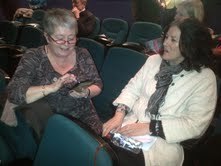
Published on March 02, 2013 05:08
Gerry Adams's Blog
- Gerry Adams's profile
- 29 followers
Gerry Adams isn't a Goodreads Author
(yet),
but they
do have a blog,
so here are some recent posts imported from
their feed.



